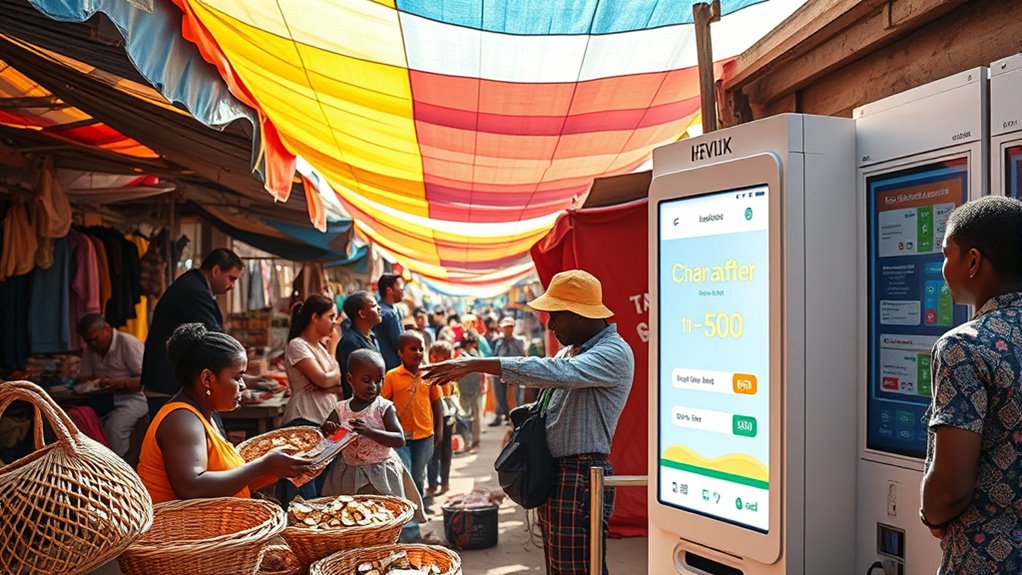Global cash pilots, including GiveDirectly’s extensive UBI trial in Kenya, show that unconditional cash improves lives by boosting health, education, and local economies. They also reveal the importance of sustainable funding, often from natural resources or land taxes, and highlight social benefits like reduced stress and greater community cohesion. While challenges like costs and political resistance persist, these experiences offer valuable lessons. To explore how these insights can shape the future of economic security, keep exploring further.
Key Takeaways
- Global cash pilots demonstrate that unconditional UBI improves recipients’ well-being, resilience, and economic participation during crises.
- Sustainable funding remains a challenge; resource rents and natural wealth are promising avenues for long-term financing.
- Evidence shows UBI fosters social cohesion, reduces inequalities, and enhances psychological well-being and personal agency.
- Successful implementation requires careful planning, political support, and addressing concerns about inflation and labor impacts.
- Longer-term, scalable UBI models are essential to fully understand and harness its potential for social justice and economic development.

Have you ever wondered whether unconditional cash transfers can truly transform lives on a large scale? The answer is increasingly being explored through global pilot programs, with GiveDirectly leading the way. Their experiment in Kenya stands out because it’s the largest and longest-term UBI trial, involving $30 million for 20,000 recipients across 195 rural villages. This program provides unconditional cash to extremely poor families, aiming to measure its impact on healthcare, education, livestock, and agriculture. While many countries have some form of cash transfer programs—like pensions for the elderly or child grants—these are often partial or temporary, not full universal basic income. Many pilots target specific populations or are limited in duration, making it difficult to assess the true potential of permanent, nationwide UBI.
From these pilots, clear outcomes emerge. Recipients tend to see improvements in quality of life, including better nutrition, living conditions, and access to healthcare and education. During crises like COVID-19, UBI participants showed greater resilience, experiencing less food insecurity and maintaining better mental and physical health. Cash transfers also encourage entrepreneurship, as recipients invest in their businesses or agricultural improvements. For example, recipients frequently spend money on water systems, irrigation, and other community investments, demonstrating how cash can stimulate local economies beyond immediate consumption. All these effects suggest that UBI restores dignity and provides the freedom to choose how you work and live, rather than being forced into employment out of necessity.
UBI improves quality of life, boosts resilience, and sparks local economic development through investments in community infrastructure.
The social and economic impacts are equally compelling. UBI helps detach income from work conditions or means-testing, giving people more freedom to pursue their interests or take time for family or education. The psychological benefits are notable—less stress, greater agency, and a stronger sense of control over one’s life. This financial breathing space can also deepen democratic participation, enabling people to engage more actively in social issues. Additionally, unconditional cash transfers can address racialized inequalities and promote social justice, fostering community solidarity and collective problem-solving alongside financial benefits. Recognizing the importance of collective ownership and resource sharing, many advocates argue that resource rents and natural wealth should be used to fund UBI, providing a sustainable alternative to traditional taxation. Moreover, integrating UBI into existing social systems can promote equity in access to resources, which is essential for long-term social stability. Funding remains a significant hurdle, though. Many critics argue higher taxes are necessary, but alternative models like taxing land or natural resources are also being considered. Most pilots rely on private donations or grants, which aren’t sustainable long-term. Concerns about costs, inflation, and potential impacts on labor markets hinder wider adoption, despite promising results. Policymakers often hesitate due to political and societal uncertainties, and resistance from the public sometimes stems from misunderstandings or mistrust of unconditional payments. Integrating UBI into existing social systems adds further complexity, requiring careful planning and political will. While the evidence is promising, these challenges highlight the need for cautious, well-informed steps toward realizing a universal income future.
Frequently Asked Questions
How Does Ubi 2.0 Differ From Previous Cash Pilot Programs?
You might notice that UBI 2.0 differs from earlier cash pilots by emphasizing scalable, community-driven approaches and integrating lessons learned from past programs. It often features more diverse locations, tailored payment structures, and stronger partnerships with local organizations. Additionally, UBI 2.0 focuses on rigorous research, policy integration, and adapting based on participant feedback, aiming for sustainable, impactful solutions that can inform broader social welfare reforms.
What Are the Long-Term Impacts of Global Cash Pilots?
You might find it surprising that global cash pilots can reduce poverty by up to 50% over time. Long-term, these programs promote economic stability, improved mental health, and social cohesion. They empower individuals to pursue education and skills, fostering a more equitable society. With ongoing data, you see how UBI could reshape global economic and social structures, creating lasting benefits that extend well beyond initial cash transfers.
How Do Cultural Differences Influence Cash Pilot Outcomes?
You should consider that cultural differences deeply influence cash pilot outcomes. Your community’s social norms, values, and trust levels shape how people accept, spend, and perceive cash transfers. In some cultures, universal payments reinforce collective identity, while stigma may deter participation elsewhere. Short-term pilots may limit behavioral change due to risk attitudes, whereas longer projects embed transfers into social routines. Tailoring programs to cultural contexts guarantees better engagement and more sustainable results.
What Technology Challenges Are Common in Implementing Ubi 2.0?
You face many technology challenges when implementing UBI 2.0. You need robust systems for identity verification, payment processing, and fraud prevention. Guaranteeing real-time updates to prevent over- or underpayments is vital, and integrating UBI with existing social safety nets requires interoperable databases and APIs. Additionally, protecting personal data, maintaining cybersecurity, and addressing digital accessibility are essential to build trust and ensure equitable distribution.
How Can Policymakers Effectively Scale Successful Cash Pilot Models?
You can effectively scale successful cash pilot models by securing strong political support and integrating them into existing social protection systems. Define clear eligibility criteria and logistics upfront, and guarantee transparency. Use robust impact evaluations to refine programs, leveraging technology for efficient disbursements. Secure multi-year funding, foster partnerships, and connect cash programs with local economic initiatives to sustain and expand their reach and impact.
Conclusion
You’ve seen how global cash pilots can boost financial inclusion, with some programs reaching over 70% of marginalized populations. These pilots show that flexible, digital cash transfers empower people and promote economic resilience. By learning from these lessons, you can help design smarter social safety nets that truly reach those in need. Embrace the potential of innovative cash solutions—they’re transforming lives worldwide and shaping a more inclusive future.









